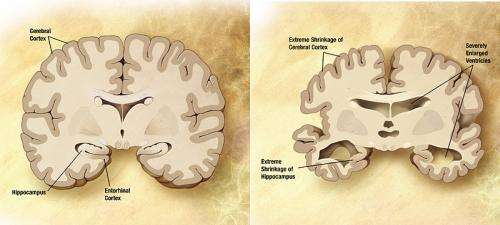Tau, not amyloid-beta, triggers neuronal death process in Alzheimer's

New research points to tau, not amyloid-beta (Abeta) plaque, as the seminal event that spurs neuron death in disorders such as Alzheimer's disease. The finding, which dramatically alters the prevailing theory of Alzheimer's development, also explains why some people with plaque build-up in their brains don't have dementia.
The study is published online today in the journal Molecular Neurodegeneration.
Neuronal death happens when tau, found inside neurons, fails to function. Tau's role is to provide a structure—like a train track —inside brain neurons that allows the cells to clear accumulation of unwanted and toxic proteins.
"When tau is abnormal, these proteins, which include Abeta, accumulate inside the neurons," explains the study's senior investigator, Charbel E-H Moussa, MB, PhD, assistant professor of neuroscience at Georgetown University Medical Center. "The cells start to spit the proteins out, as best they can, into the extracellular space so that they cannot exert their toxic effects inside the cell. Because Abeta is 'sticky,' it clumps together into plaque," Moussa says.
He says his study suggests the remaining Abeta inside the neuron (that isn't pushed out) destroys the cells, not the plaques that build up outside. "When tau does not function, the cell cannot remove the garbage, which at that point includes Abeta as well as tangles of nonfunctioning tau, and the cell dies. The Abeta released from the dead neuron then sticks to the plaque that had been forming."
Moussa's experiments in animal models also show less plaques accumulate outside the cell when tau is functioning; when tau was reintroduced into neurons that did not have it, plaques did not grow.
Malfunctioning tau can occur due to errant genes or through aging. As individuals grow older, some tau can malfunction while enough normal tau remains to help clear the garbage. In these cases, the neurons don't die, he says. "That explains the confusing clinical observations of older people who have plaque build-up, but no dementia," Moussa says.
Moussa has long sought a way to force neurons to clean up their garbage. In this study, he shows that nilotinib, a drug approved to treat cancer, can aid in that process. Nilotinib helps the neuron clear garbage, but requires some functional tau, he says.
"This drug can work if there is a higher percentage of good to bad tau in the cell," Moussa says. "There are many diseases of dementia that have malfunctioning tau and no plaque accumulation, such as frontal temporal dementia linked to Parkinsonism," Moussa says. "The common culprit is tau, so a drug that helps tau do its job may help protect against progression of these diseases."
More information: The full study was published earlier this month is Molecular Neurodegeneration: www.molecularneurodegeneration … tent/9/1/46/abstract
















